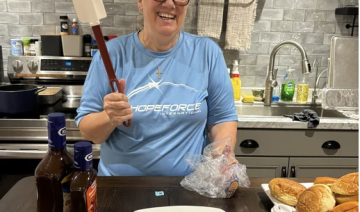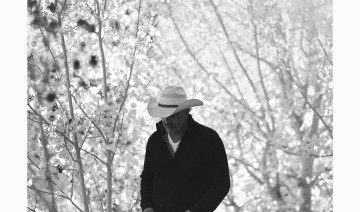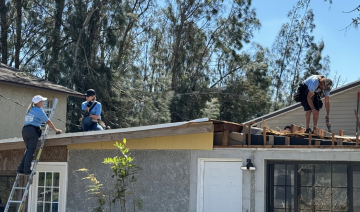Unlike Natural Disasters
March 23, 2011
While much of Hope Force International's publicized efforts of late are centered on Haiti or Nashville, aid to impoverished pockets in the Appalachian Mountains has been an ongoing endeavor since July 2009. At the moment, Craig Snow is the permanent one-man team there and was gracious enough to lend some insight into the efforts in the area.
When asked what caused Hope Force to even think about reaching out to Appalachia, Snow simply says, "Divine leadership." Different members of Hope Force began to wonder where the next assignment would be when a program popped up on their radar that exposed the poverty of Americans living in the Appalachian region. Snow said after some initial visits to the area, Hope Force felt moved to respond, and were well aware this opportunity was unlike natural disasters. "It's a chronic disaster brought on by poverty, and it gives our reservists a chance to intentionally go out and extend compassion to those in need while still looking ahead, as opposed to when a disaster hits and there is a need for care now."
Snow said after some initial visits to the area, Hope Force felt moved to respond, and were well aware this opportunity was unlike natural disasters. "It's a chronic disaster brought on by poverty, and it gives our reservists a chance to intentionally go out and extend compassion to those in need while still looking ahead, as opposed to when a disaster hits and there is a need for care now."
The ministry in Appalachia still allows Reservists to respond at the drop of a hat like they would to a natural disaster but it also offers flexibility to those who want to extend compassion while accommodating their work schedules. The ministry's main focus is providing people with safe shelter, an unfortunately uncommon fixture of housing in that area. Thus, a central focus of this rebuilding effort is making sure homes stay dry.
"Roofs are just neglected or compromised, so if rain or snow come, a lot of houses -- if not every single one I've walked into -- has issues of water penetration inside," said Snow. "In extreme cases, we served one elderly gentlemen who had only one bedroom that didn't leak; all four other rooms in his house did, so when it rained he had buckets throughout his house. He's been dealing with that for several years, so now you've got structural integrity that's compromised because of the moisture that's on material not designed to handle that."The emphasis on rebuilding roofs dates back to Hope Force's first involvement in the Appalachian area. Snow met the director of a charity called Big Creek People in Action, a local group that has been passionate about grass-roots restorative work in their community for the last seventeen years. Initially they fought to bring clean drinking water to areas that had none, and from there began focusing on four specific targets: education, childcare, community events, and home repairs.
But even the applications for homeowners coming to this grass-roots organization say, "We can not do any roof repairs, because they don't get that technical in their skills," said Snow. "So when I met the director and said, 'Can we be of any help?' they asked right off the bat, 'Do you do any roofs?' So we've been investing our main focus on structural repairs, plumbing, and electrical, and again, it's getting back to addressing helping these homes become safe and dry."
So far eighteen families have been helped through Hope Force's efforts, and Snow already has 200 volunteers signed up to help with further projects this year. Reservists are stationed at a permanent team house which holds sixteen people at a time. Click here for more details. Snow hopes one day the ministry will grow to a place where he'll have more permanent staff, but for now it is largely a one-man show. The aim is to continue to grow a more established organizational presence in the region to keep bringing about holistic aid.
When asked if much fostering of intentional relationships occurs with aided families, Snow notes they're not as strong in that area because of the limited manpower. He did acknowledge, though, many people they've served have become friends and that, through the process of extending compassion and aid, relationships are being built. Snow references the word "compassion" regularly, but also says the process of giving aid to Appalachian families is just as much focused on the end goal of empowerment.
"We require contribution of materials; we don't give everything away. Even if it's five cents on the dollar, we require them to participate, and by challenging one young family to participate, what I've seen over the year is them taking additional intentional steps to be greater stewards of what they have to break their own cycle of poverty. Now both the parents are employed, and I think that some of the trappings they found themselves in had polarized them, but we helped, and I think there's been contact with others to where we can look back and say, 'We played a role in helping them take general steps to break the cycle of poverty.'"





